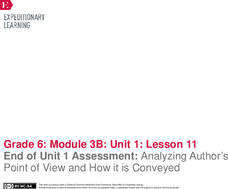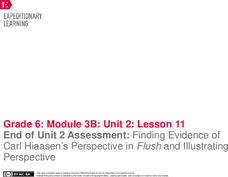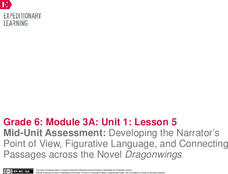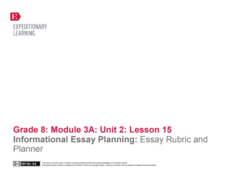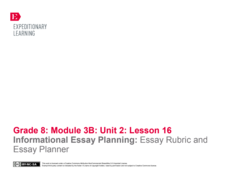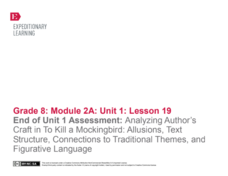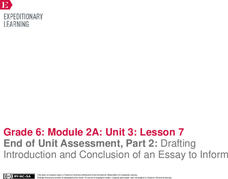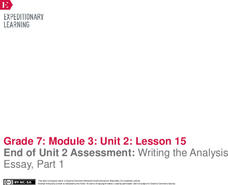EngageNY
End of Unit Assessment: Writing Best First Draft of “Back Again” Poem
Team up! Scholars begin working with their research teams to review the components of an effective poem. They then move on to independent work by beginning the end-of-unit assessment. Writers complete the draft of their "Back Again"...
EngageNY
Mid-Unit Assessment: Analyzing Author’s Purpose in Speech and Text
Part one of a mid-unit assessment relating to The Omnivore’s Dilemma includes listening to and analyzing a speech by Birke Baehr. Part two involves analyzing an excerpt from the text. The assessment ends with short response questions.
EngageNY
End of Unit 3 Assessment: Writing a Research Synthesis
Ready, set, write! Scholars work on the end-of-unit assessment by completing a writing prompt. They then look at the model performance task from instructional activity two to create a rubric for scoring the exercise. Using turn and talk,...
EngageNY
End of Unit Assessment: Research Synthesis
Writers near the end of the unit and begin working on the end-of-unit assessment. They analyze the prompt and a model performance task. The class then begins creating a rubric for the assessment by writing bullet points from their think...
EngageNY
End of Unit 1 Assessment: Analyzing Author’s Point of View and How it is Conveyed
One step at a time. Scholars complete the end of unit assessment by reading pages 70–75 of World without Fish and analyzing each paragraph one at a time. They highlight key words leading to author's point of view and complete a...
EngageNY
End of Unit Assessment, Part 1: Revising Claims and Evidence Based on Feedback
Revisit, revise. Scholars receive their position papers returned with feedback from the teacher. They use colored pens to identify feedback related to the first two rows of the rubric and correct their papers based on the comments....
EngageNY
End of Unit 2 Assessment: Finding Evidence of Carl Hiaasen’s Perspective in Flush and Illustrating Perspective
The end is here. Scholars work independently on End of Unit 2 Assessment: Finding Evidence of Carl Hiaasen’s Perspective in Flush and
Illustrating Perspective. Learners use their graphic organizers and text to write to a prompt asking...
EngageNY
End of Unit 3 Assessment: Drafting the Newspaper Article
Choose your words carefully. Scholars continue looking at the creation of a newspaper article by examining word choice. They highlight key verbs, vocabulary, and descriptive words in the model article Sandy wreaks havoc...
EngageNY
Mid-Unit Assessment: Developing the Narrator’s Point of View, Figurative Language, and Connecting Passages across the Novel Dragonwings
Let's get creative! As part of a mid-unit assessment, scholars create a piece of artwork illustrating the theme from Laurence Yep's novel, Dragonwings. Additionally, pupils use a graphic organizer to identify figurative language in...
Fluence Learning
Writing an Argument: Innovation in America
Are American young people prepared to become tomorrow's leaders in technological innovation, or does an obsession with being cool sidetrack essential skills? That is the question freshmen and sophomores must address in a performance...
EngageNY
Informational Essay Planning: Essay Rubric and Planner
Pupils walk through the process of writing essays for their final assessment of Unbroken. They begin by reviewing the rubric using Rubric Criteria strips that assign a portion of the rubric to each pair of learners. They then participate...
EngageNY
Informational Essay Planning: Essay Rubric and Essay Planner
Class members dig into the expectations for the end-of-unit assessment for A Mighty Long Way by studying the rubric. The Rubric Criteria strips help pairs of readers look more closely at specific rubric points. They share ideas with the...
EngageNY
End of Unit 3 Assessment: Readers Theater Commentary
Prove it! In the end-of-unit assessment, scholars write a commentary and provide evidence to justify the connection between their reader's theater scripts and To Kill A Mockingbird. After completing the assessment, they practice...
EngageNY
Mid Unit 2 Assessment: Text to Film and Perspective Comparison of to Kill a Mockingbird (Chapter 18 and One Scene from Chapter 19)
Have you ever heard someone say the movie is not like the book? Scholars complete a mid-unit assessment to compare scenes from the novel To Kill a Mockingbird to the movie version. The assessment contains short answers, multiple choice,...
EngageNY
End of Unit Assessment Parts 1 and 2: Evaluating Arguments and Claims
Which came first: the chicken or the egg? As part of the end-of-unit assessment for The Omnivore’s Dilemma, scholars watch a video about organic eggs versus conventional farm eggs. They use graphic organizers to collect evidence as they...
EngageNY
End of Unit 2 Assessment, Part One: First Draft of Analysis Essay
How do writers use evidence from literary texts to support analysis and reflection? With instructional activity 17 of 20 from the Grade 8 ELA Module 1, Unit 2 series, learners gather resources to prepare for an end-of-unit assessment....
EngageNY
End of Unit 1 Assessment: Analyzing Author’s Craft in To Kill a Mockingbird: Allusions, Text Structure, Connections to Traditional Themes, and Figurative Language
Scholars demonstrate their learning with an end-of-unit assessment. They work independently to discuss the Golden Rule and its relationship in To Kill a Mockingbird.
EngageNY
Writing to Inform: Analyzing a Model Using a Rubric
Learn to write right. Scholars analyze the model essay Adversity Faced by Townspeople in the Middle Ages. They discuss the essay and make annotations working with an elbow partner. Learners then take another look at the essay using a...
EngageNY
End of Unit Assessment, Part 2: Drafting Introduction and Conclusion of an Essay to Inform
A powerful introduction and conclusion can really pack a punch. Using the resource, scholars first read and discuss a model essay. Then, as part of the end of unit assessment, they draft the introductory and concluding paragraphs of...
EngageNY
End of Unit Assessment: Tracing and Evaluating Arguments
Give water the attention it deserves. Scholars watch Corporations Need to Pay More Attention to Water and respond to questions as part of their end of the unit assessment. They then complete the assessment by reading and responding to...
EngageNY
End of Unit 2 Assessment: Writing the Analysis Essay, Part 1
1,2,3,4 score! Writers use the grading rubric to score the model essay. After comparing and discussing their scorings, the individuals begin the end-of-unit assessment.
EngageNY
Mid-Unit 1 Assessment: Making Inferences from Percy
Time to shine! Scholars show everything that they have learned so far in the unit by completing a mid-unit assessment. In the assessment, they discuss the gist of sections of text from The Lightning Thief and inferences they made about...
EngageNY
Grade 10 ELA Module 1: Unit 3, Lesson 14
A thorough unit on literary analysis and character development culminates in a final writing assessment. Prompted to compare the parent-child relationships in Amy Tan's The Joy Luck Club and H.G. Bissinger's Friday Night Lights, high...
EngageNY
Mid-Unit Assessment: Analyzing Point of View and Plot Development in Flush
It's the halfway point—there's no turning back now. Scholars work on the mid unit assessment for Flush. For the assessment, learners analyze the point of view and plot development by annotating the text using sticky notes and underlining...




